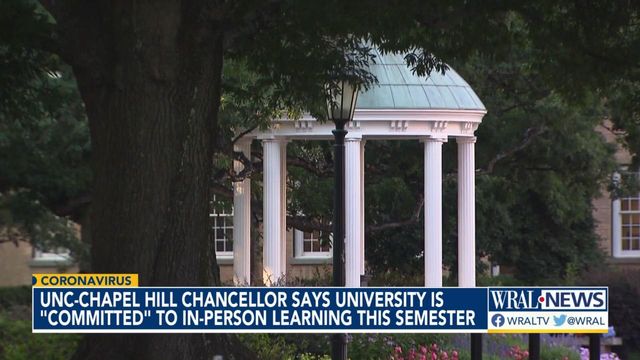COVID-19 cluster identified at event in UNC-Chapel Hill's pharmacy school
The University of North Carolina at Chapel Hill reported its first COVID-19 cluster of the school year on Wednesday.
Posted — UpdatedThe cluster, which is five or more cases close that are deemed close in proximity or location, was related to an event in the Eshelman School of Pharmacy.
School officials said they were working with the Orange County Health Department to identify additional potential exposures.
The announcement of the cluster came on the same day that UNC's Campus and Community Advisory Committee met.
During the meeting, Chancellor Kevin Guskiewicz said school leaders were committed to in-person learning.
"We have no intentions of pivoting to a remote learning environment or sending students home," said Guskiewicz, adding that staff will take any necessary precautions to keep students on campus.
"We will be advising our deans and all of our chairs to bring compassion and flexibility to their decision-making," added Provost Bob Blouin.
Some professors though raised concerns about the university's lack of a vaccine mandate.
Guskiewicz said that while there is a high vaccination rate among students, only 64 percent of staff is vaccinated.
"The System Office has never said that there would never be a vaccine mandate. Currently, we have been told that we don't have the authority to mandate the vaccine, but again, that could change," said Guskiewicz.
Faculty and staff are required to either show proof of vaccine by Sept. 15 or submit to weekly testing.
Guskiewicz said that he and Blouin supported a vaccine mandate, and would "advocate where I can."
Thomas Kelly, who will be teaching in a clinical setting, said he was concerned about breakthrough COVID-19 cases and long-haul symptoms.
"I do not feel safe," he said. "I still don't understand why we don't have a mandatory vaccination policy."
"I just don't approve of our reopening plan because what we're telling people is we can have a full reopening and we don't have to require vaccines. I don't think we can have our cake and eat it too," said professor Seth Noar.
Graduate student Amanda Smythers told WRAL News she believes university officials could be doing more to protect the community.
"I would like to see the university put the health of our community about the feelings of individuals at our system office," she said.
Smythers said she'd like for the university to follow the model of other large public schools across the country.
"By doing two times a week testing, including random testing of vaccinated individuals," added Smythers.
Guskiewicz said that before the start of classes next Wednesday, unless students have verified they are vaccinated, they will be tested weekly for the virus. He added that 84 percent of students living and learning on campus for fall semester have proven they are vaccinated.
"Only 3,200 students have not yet attested [they are vaccinated]," said Guskiewicz.
Related Topics
• Credits
Copyright 2024 by Capitol Broadcasting Company. All rights reserved. This material may not be published, broadcast, rewritten or redistributed.





